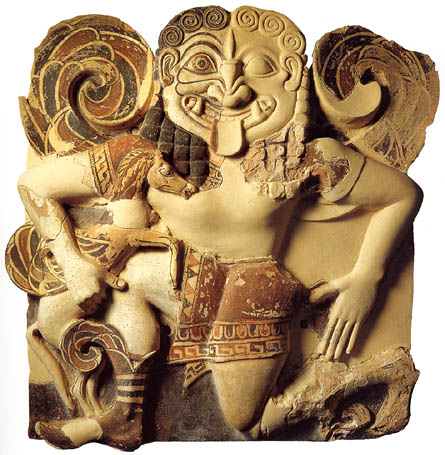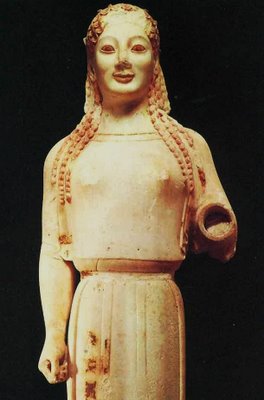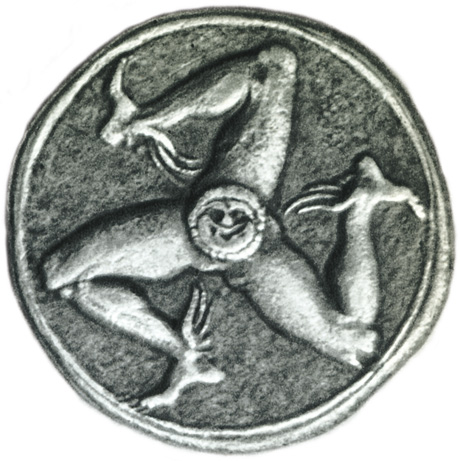Introduction: Spring, 1st year of the 67th Olympiad (512 BC)
“Medes,” grunted the middle-aged figure, who now paced back and forth across the bare floor of his chamber, only a single onlooker nodding his head agreeably, as he always did during these rants, “medes, medes, medes! That is all that rings in my ears, all that permeates the air that we breath, from Ionia in the east to our island here in the west. The fear that, simply because they dare cross the Hellespont and subdue such a backwater polis as Maroneia, they may set foot even here...why, it is lunacy!”
The chamber, grand in scale and almost as large as most tyrants throne rooms, was less like a room where one ate and slept and more like a hall of trophies mixed together with a large influence from places of education and knowledge. At one end of the room, as you would expect, there was a bed large enough for three, but beside it a table covered in wax tablets and all manner of styli, which from the look of them had recently been used. These tablets did not just sit on the expertly crafted wood, but over the bed, in some alcoves where busts of great heroes and figures looked out, and where this self-opinionated man often decided to squat and drink a great deal of uncut wine. Like some barbarian.
Right now he paced the part of the room closer to the door, a door so large that four men abreast could wander through it without difficulty. The wood was at least a hands-width thick, hinges of heavy iron wrought on them, as was a firm lock which would except only one key. Here there was placed another table, leaving the middle of the room open and clear and much more appropriate for such pacing, but being where guests would be met first it would be their first point of contact with the man that some said was the most smooth-tongued in all of Sikelia.
What was most surprising were the other alcoves, deep set and arched enclosures of stone, where, placed upon pedestals and lovingly kept clean, were all manner of items collected from journeys made by this man, the famous Sosion of Kamarina. There were helmets, plumed and not, some of the Kretan style and others the Korinthian, aspides with a dozen different painted designs on there bronze-faced frames, and gifts, such as the flowing purple cape that had been given to the envoy of Surakoûsai by those bitter rivals of that city-state, the Phoenikians of Karkhēdōn that had founded colonies on Sikelia, much like those Hellenes before them.
It was due to the work of this one man that, in the course of the first year of the Olympiad, treaties had been signed with the prospering Rhodian colony of Gela, and the Lakedaemonian-led town of Selinus, both powers of their own on the island. Treaties of trade and peace between them, gifts exchanged as signs of good will, and with the colonists from Phoenikia spreading across North Africa, western Sikelia and the islands of the Tyrrhenian Sea, they were alliances that Surakoûsai could not afford to offer to the other Hellenes of the island. Not only this, but he had strengthened relations with the native Sikels of the eastern island, going so far as to entice nearly a thousand allied hoplitai into the service of the prosperous Korinthian settlement.
All this, and more, he had done, becoming quite the personified symbol of luck and with some more blasphemous citizens even calling him the son of Hermes because of his persuasive tongue. With the quite substantial support of the aged Epicydes of Surakoûsai, a man nearly as old as seventy years, and leader of the oligarchs of Surakoûsai and her larger settlements; Akrai, Heloros on the south-eastern coast, and Kasmenai nestled in amongst the rolling slopes and deep valleys of the Hyblaean Mountains of central Sikelia. Everywhere he went he was known, a man who knew things and could solve any problem, but it was his servant, a boy who stayed close to his masters heels at all times, that this tale concerns but who, as 'small folk' through the centuries, was ignored by almost everyone.
“Now news reaches us here that the Lakedaemonians have taken and sacked the polis of their great foe, those sons of the Argolid, mighty Argos herself.”
Sosion had never appeared this way to his young erômenos before, agitated and even a little unbalanced, briefly ceasing his erratic movements to be handed a mug of wine before continuing his tirade, those youthful eyes looking on.
“The Athenians! The damned Athenians! Always blowing so much air about opposing the Medes, then they go and sign a treaty with them. Even after they...”
Finally, seeing the confused gaze of the adolescent sitting comfortably on the rug-draped floor, Sosion waved an aggravated hand through the air and slumped into a seat at the table. Rubbing a hand through his thick head of brown hair, the curls spreading lightly over his hand, he then gestured for his young lover to come and take a seat next to him. It was not the boys place to refuse, and he did not, going willingly and taking a seat next to his mentor and erastes.
“Oh Leukokomas,” he sighed, the boys name meaning 'bright hair', “everything is moving so quickly...and Epicydes intends to send Tisandros to acquire Megara Hyblaea from the cities leaders.”
The boy, who was no longer a 'boy' but fifteen years of age, and who was not named Leukokomas but Euaristos, watched as his lover and teacher of the last five years drifted away into a slow slumber, catching the empty cup that nearly feel from his unconscious hand and placing a warm chalmys over his snoring form. It was not the first time that Euaristos had had to perform these duties, and would probably not be the last, but sometimes he did wish it would be.
Euaristos was a Kretan, born into a poor family from Eleutherna, who had more-or-less sold him into an uneven relationship with a man he had never met and did not much care for. Not at the time, and not much more over the following years either. He was an attractive boy, more feminine than any other he knew, with a smooth face ending in a pointed chin, broad shoulders for one his age, a narrow waist and lithe developing muscles that would one day be like those of a grown man but were still growing.
All this was topped off by his long blonde hair, long and braided because of the customs of the Kretans, customs taken to Sparta herself it was said, and hair which contrasted pleasingly with his rather pale skin for a Greek and especially someone raised on a sun-blistered island for ten years.
Although he did not know it, he suspected his father may have sold him simply because he considered him too effeminate. Then again, his father had always been a bastard, too lazy to teach him how to be a man and too abusive to ever say a kind word to him.
Perhaps it was Tyche, luck, that had bought Sosion to the island. Ordered, he always said, to visit the Kretan nobility and garner support amongst them. That did not matter to Euaristos, not much did, he had been well looked after by this celebrated diplomat and wanted for nothing, had seen parts of the world that others only spoke of, and been taught his letters all by the time he was twelve. For this he was truly thankful, but even Sosion was too much like his father, becoming drunk when something excited him too much or depressed him. It was particularly during the act of copulation, something that Sosion did rarely, thank the Gods, that he became violent, due to an affliction which caused a flaccidity the envoy could do without.
“No,” Euaristos thought to himself, “I should have been involved in the harpagmos...taken by someone I may have accepted. Given away to a drunk by a drunk. I am sorry, Sosion, but it is not the life I wished for.”
That was the point, watching Sosion wheeze away gently, that Euaristos decided to abandon him and make something of himself.
Tisandros he had said, the oligarch of Akrai...
With as much haste as he could muster, whispering a prayer to the Gods for both forgiveness and swift feet, he took the possessions that he owned and placed them in a hide bag which he could carry over his shoulder. Those possessions were not much; a stylus, a spare chiton and chalmys, a pair of Kretan boots which were a painful reminder of his home, and a felt cap which was reminiscent of those worn by Lakedaemonian helots. The only other thing he took was not money, although he could have taken a talents worth in silver if he had wished, but some items of food for a journey to Megara Hyblaea and the siege-lines there.
“Farewell,” he whispered to the dribbling man, his lover but also his willing enslaver, kissing him on the forehead and slipping the cap over his head before slipping like a phantasm out of the door.












 Reply With Quote
Reply With Quote




























